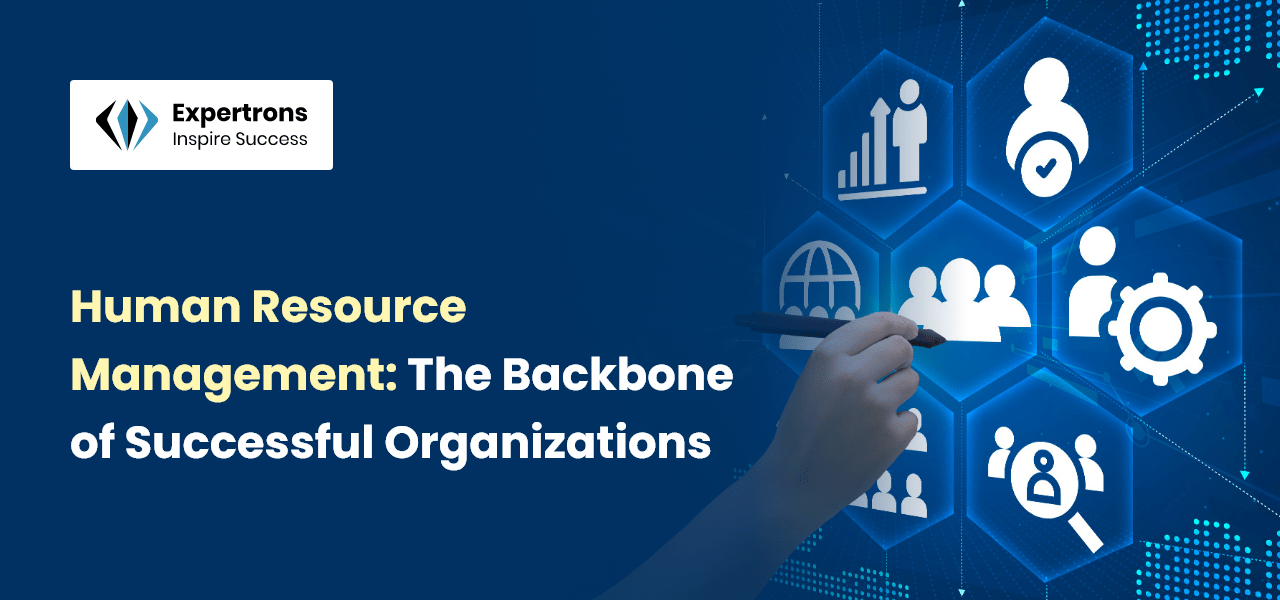Introduction
Human Resource Management (HRM) is often likened to the heartbeat of an organization. Just as a heart pumps blood to sustain life, HRM ensures that a company thrives by effectively managing its most crucial resource: its people. But what exactly does HRM entail, and why is it so vital?
In this comprehensive guide, we’ll delve deep into the intricacies of HRM, exploring its functions, challenges, and future trends, with a spotlight on Expertrons and their innovative approach to HRM in their Advanced General Management Program in association with E&ICT Academy IIT Guwahati.
What is Human Resource Management?
Definition and Scope
At its core, Human Resource Management is the strategic approach to the effective management of people in an organization, so that they help the business gain a competitive advantage. It is designed to maximize employee performance in service of an employer’s strategic objectives. HRM is concerned with managing people within organizations, focusing on policies and systems.
Evolution of HRM
HRM has evolved significantly over the decades. Initially, it was more about administrative tasks such as payroll and benefits administration. Today, it plays a strategic role, involving talent management, organizational development, and aligning HR strategies with business goals.
Key Functions of Human Resource Management
Recruitment and Selection
Recruiting the right talent is fundamental to an organization’s success.
Job Analysis and Design
This involves identifying the skills and qualifications needed for a job and designing roles that align with organizational goals.
Interviewing and Hiring
Effective interviewing and hiring processes ensure that the best candidates are selected, reducing turnover and enhancing productivity.
Training and Development
Investing in employees’ growth is crucial for maintaining a competitive edge.
Onboarding New Employees
A well-structured onboarding process helps new hires integrate smoothly into the company culture and hit the ground running.
Continuous Professional Development
Providing ongoing training opportunities ensures that employees keep their skills updated, which is essential in today’s rapidly changing business environment.
Performance Management
Managing performance is about more than just annual reviews; it’s an ongoing process.
Setting Objectives and Goals
Clear, achievable goals help employees understand what is expected of them and how they can contribute to the organization’s success.
Performance Appraisal
Regular appraisals provide an opportunity to recognize achievements, address areas for improvement, and plan for future development.
Compensation and Benefits
A fair and motivating compensation system is vital for attracting and retaining talent.
Salary Structures
Establishing clear salary structures helps ensure equity and transparency in pay.
Employee Benefits
Offering a comprehensive benefits package can enhance job satisfaction and loyalty.
Employee Relations
Maintaining positive relationships between the organization and its employees is essential.
Conflict Resolution
Effective conflict resolution strategies can prevent minor disagreements from escalating into major issues.
Employee Engagement
Engaged employees are more productive, innovative, and committed to their work.
The Strategic Role of HRM
Aligning HRM with Business Goals
HRM must be aligned with the overall business strategy to drive organizational success.
HRM as a Business Partner
Modern HR professionals act as business partners, contributing to strategic decision-making and helping shape the company’s future.
Challenges in Human Resource Management
Managing Diversity
Creating an inclusive workplace that values diversity can enhance creativity and innovation.
Technological Advancements
Keeping up with technological changes is a constant challenge, but it also offers opportunities for improving HR processes.
Compliance with Laws and Regulations
Staying compliant with labor laws and regulations is critical to avoid legal issues and promote fair treatment of employees.
The Future of Human Resource Management
Trends in HRM
From remote work to employee well-being, several trends are shaping the future of HRM.
The Role of AI in HRM
Artificial intelligence is revolutionizing HRM, from automating routine tasks to providing data-driven insights.
Best Practices in Human Resource Management
Creating a Positive Work Environment
A positive work environment boosts morale and productivity.
Promoting Work-Life Balance
Encouraging work-life balance can lead to happier, healthier, and more productive employees.
Fostering a Culture of Continuous Improvement
A culture that promotes continuous improvement helps organizations stay competitive and adapt to changes.
Case Studies in Effective Human Resource Management
Successful Companies and Their HRM Practices
Expertrons is a prime example of effective human resource management. Their Advanced General Management program, in association with E&ICT Academy IIT Guwahati, showcases best practices in HRM. They emphasize comprehensive training, continuous professional development, and strategic alignment of HR goals with business objectives. By focusing on employee engagement and creating a supportive work environment, Expertrons ensures that their workforce remains motivated and productive.
Also read, 10 Beneficial Reasons On Why To Choose HR As a Career
Conclusion
Human Resource Management is a dynamic and integral part of any successful organization. From recruiting the right talent to fostering a positive work environment, effective HRM practices are essential for achieving business goals and ensuring employee satisfaction. As we look to the future, staying adaptable and embracing new trends and technologies will be key to maintaining a thriving workforce.
Frequently Asked Questions
The main functions of HRM include recruitment and selection, training and development, performance management, compensation and benefits, and employee relations.
HRM contributes to business success by ensuring that the organization has the right people in place, fostering a positive work environment, and aligning HR strategies with business goals.
Some of the latest trends in HRM include the use of AI, a focus on employee well-being, and the rise of remote work.
Companies can manage diversity effectively by promoting an inclusive culture, providing diversity training, and implementing fair hiring practices.
Technology plays a significant role in HRM by automating routine tasks, providing data-driven insights, and improving communication and collaboration.











